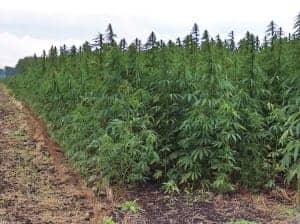by Michael Harris

An official USDA marijuana study shows possible yields of 400-500 pounds per acre of high yield production utilizing natural organic methods. Should Black farmers grow marijuana as a strategy to stabilize Black land loss in America?
In California, a political hot ticket item for November 2010 is the question of providing a path toward recreational marijuana use.
After emotions and posturing define and identify positions, then a broader conversation about the pros and cons of recreational marijuana vs. medical marijuana as an agricultural commodity will take place. Innovative ideas about a National Marijuana Trade and Commodity Board to facilitate a $40 billion market stabilized by a Black community with diet related health challenges where marijuana is believed to elevate the spirits is a real possibility.
Our Black Food and Agriculture Forum July 15-18, 2010, at the Marriott Oakland City Center in Oakland will invite an elevated conversation to take center stage as part of the discussion on Wall Street reform and consumer protections.
Earlier this year, the USDA announced the availability of block grants to enhance the competitiveness of specialty crops, defined as fruits, vegetables, tree nuts, dried fruits, horticulture and nursery crops. Our focus remains organic produce.
Marijuana is the No. 1 cash crop in California and we were invited to join the conversation.
Several Black farmers considered collaborative partnerships to utilize this window of opportunity to restore Black agricultural producers to competitive status in the 200-300 percent return on investment currently realized in the marijuana industry.
Faith based communities, NAACP, Urban League, Congress on Racial Equality and many other leading national organizations are beginning to debate the broader economic impact of marijuana on the Black community.
Marijuana is an agricultural product. However, broader adult conversations with primary source documentation about the No. 1 cash crop and other related lucrative ethnic specialty crops has yet to translate to support for a national Black agriculture action agenda.

Southern Black farmer leaders have put 100 percent effort into obtaining Pigford II funding of up to $1.25 billion for the class of litigants who did not get news or equal access in 1997, when the suit charging discrimination in federal lending was initially settled. A nationwide conversation about racial justice in U.S. agriculture is avoided at all cost.
Today, U.S. Department of Agriculture public law still mandates a wide disparity in access and equal opportunity via the 1862 vs. 1890 notion of land grant under the Morrill Act. Strange but true: Many of these same Black farm leaders embrace ongoing second class status and support agriculture labor law that facilitates a modern day slave-like status for undocumented agricultural labor, impacting U.S. immigration and destabilizing the true value of harvesting local food production.
First Lady Michelle Obama has inspired a nation with her Let’s Move campaign and we look forward to sharing our path toward restoring agriculture as the foundation of Black culture to the beat of the African drum.
Black agriculture is the healthy solution to providing essential access to fresh organic produce to the most impacted communities suffering from diet related disease.

As the California NAACP correctly points out, the wide disparity in marijuana related law enforcement applied in Black communities is the foundation of a historic position by our most respected civil rights organization.
California faith based leaders reject this political stance and are considering a renewed effort to provide fresh organic fruits, vegetables, herbs and spices to those faith based community members as an alternative to getting high.
The National NAACP will meet next week in Kansas City. First Lady Michelle Obama will highlight her Let’s Move Faith Based Tool Kit to provide a better way toward good health outcomes.
A wonderful expanded conversation about marijuana and the possibility of the No. 1 cash crop in America saving Black farmers is possible.
An essential question is medical choice vs. recreational choice, since somebody is growing the product, packaging, transporting, financing and providing the medical documentation necessary to do so legally under California law.
A projected $40 billion nationwide marijuana market could restore Black agricultural producers back to 15 percent of the U.S. agriculture marketplace. Today we are less than 1 percent.
Michael Harris writes for BlackAgriculture.com.





